
In a new study from Cedars-Sinai, researchers found infection with the virus that causes COVID-19 can trigger an immune response that lasts well beyond the initial infection and recovery—even among people who had mild symptoms or no symptoms at all.
When people are infected with a virus or other pathogen, their bodies unleash proteins called antibodies that detect foreign substances and keep them from invading cells.
In some cases, however, people produce autoantibodies that can attack the body’s own organs and tissues over time.
The team found that people with prior infection with SARS-CoV-2, the virus that causes COVID-19, have a wide variety of autoantibodies up to six months after they have fully recovered.
Prior to this study, researchers knew that severe cases of COVID-19 can stress the immune system so much that autoantibodies are produced.
This study is the first to report not only the presence of elevated autoantibodies after mild or asymptomatic infection but their persistence over time.
The team says these findings help to explain what makes COVID-19 an especially unique disease.
These patterns of immune dysregulation could be underlying the different types of persistent symptoms doctors see in people who go on to develop the condition now referred to as long COVID-19.
To conduct their study, the research team recruited 177 people with confirmed evidence of a previous infection with SARS-CoV-2.
They compared blood samples from these individuals with samples taken from healthy people prior to the pandemic. All those with confirmed SARS-CoV-2 infection had elevated levels of autoantibodies.
Some of the autoantibodies also have been found in people with diseases in which the immune system attacks its own healthy cells, such as lupus and rheumatoid arthritis.
The team found signals of autoantibody activity that are usually linked to chronic inflammation and injury involving specific organ systems and tissues such as the joints, skin and nervous system.
Some of the autoantibodies have been linked to autoimmune diseases that typically affect women more often than men. In this study, however, men had a higher number of elevated autoantibodies than women.
Because this study was in people infected before the advent of vaccines, the researchers will also examine whether autoantibodies are similarly generated in people with breakthrough infections.
If you care about COVID, please read studies about drug that can offer much-needed COVID-19 protection, and vaccines may not prevent severe COVID-19 in these people.
For more information about health, please see recent studies about new antibody treatment for COVID-19, and results showing aspirin and other drugs for inflammation could help prevent COVID-19 deaths.
The study is published in the Journal of Translational Medicine. One author of the study is Justyna Fert-Bober, Ph.D.
Copyright © 2021 Knowridge Science Report. All rights reserved.



